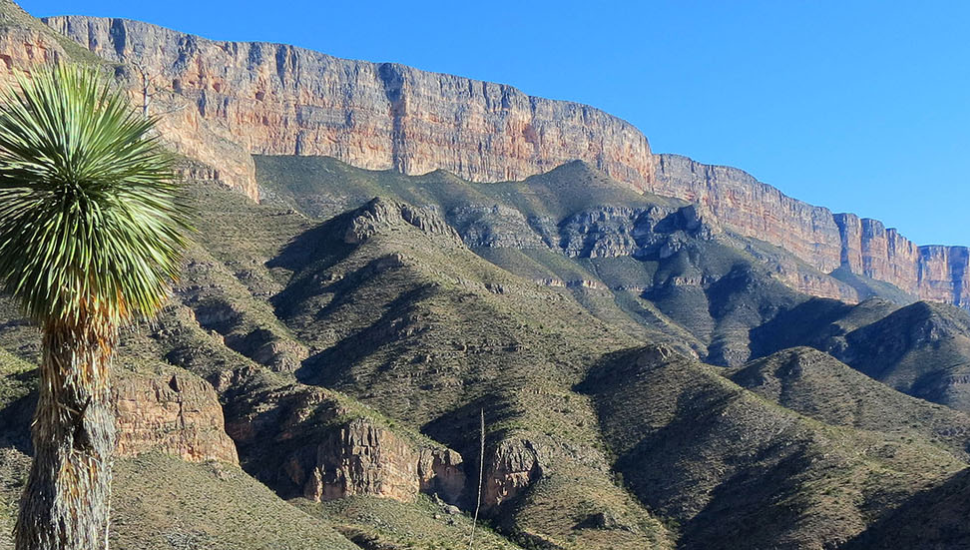Highlights:
- Results from 41 underground channel samples include values of 1.0m breccia with 1,558 g/t AgEq1, 1.2m breccia with 814 g/t AgEq1 and 1.0m breccia with 1,018 g/t AgEq1 at two of the historical workings.
- Results from 200 surface channel samples include values of 1.0m breccia with 248g/t AgEq1, 1.5m fault breccia with 162 g/t AgEq1, and dump samples of 2,645 g/t AgEq1 and 704 g/t AgEq1.
April 23, 2019, Toronto, Ontario – Discovery Metals Corp. (TSX-V: DSV) (“Discovery” or the “Company”) is pleased to announce the assay results of 241 samples from surface and underground at its Monclova project (“Monclova” or the “Project”) in Coahuila State, Mexico.
Gernot Wober, VP Exploration, states, “Results from our surface and underground sampling program at Monclova continue to return high-grade mineralization from the well-exposed breccias in and around multiple historical workings at the Real Viejo area. Real Viejo itself sits within a mineralized trend over 1,500m long at the southern edge of the intrusive complex in contact with limestone, where breccias have been mapped several meters wide. Mapping, sampling and geophysics are now complete at this key near-term target where we are finalizing our phase 1 drill planning.”
Results
Continued work at Monclova resulted in the 241 samples being selected from surface and underground mineralization. Highlight samples from the 200 surface and 41 underground samples are presented in Table 1 below. For a surface plan map showing the locations of the samples as well as a complete table of all results, please view the link in the “References” section at the end of this release.
Table 1. Highlights of surface and underground sampling results from Monclova
| ID | LOCATION | AREA | TYPE | WIDTH (M) | AG (G/T) | AU (G/T) | CU (%) | PB (%) | ZN (%) | AGEQ1 (G/T) |
|---|---|---|---|---|---|---|---|---|---|---|
| 253080 | Underground | Real Viejo | Channel | 1.0 | 450 | 0.01 | 0.14 | 2.9 | 16.1 | 1,558 |
| 253075 | Underground | Real Viejo | Channel | 0.7 | 1,005 | 0.02 | 0.36 | 2.1 | 5.9 | 1,493 |
| 253081 | Underground | Real Viejo | Channel | 0.8 | 309 | 0.01 | 0.06 | 9.6 | 8.5 | 1,216 |
| 253085 | Underground | Real Viejo | Channel | 1.0 | 507 | 0.01 | 0.21 | 6.1 | 4.0 | 1,018 |
| 223826 | Underground | Real Viejo | Channel | 1.2 | 714 | 0.03 | 0.08 | 0.5 | 1.1 | 814 |
| 223827 | Underground | Real Viejo | Channel | 0.9 | 388 | 0.06 | 0.13 | 1.2 | 3.5 | 666 |
| 253074 | Underground | Real Viejo | Channel | 0.5 | 383 | 0.02 | 0.18 | 0.8 | 1.4 | 526 |
| 223825 | Underground | Real Viejo | Channel | 1.0 | 116 | 0.01 | 0.05 | 0.2 | 4.2 | 382 |
| 253079 | Underground | Real Viejo | Channel | 0.3 | 67 | 0 | 0.03 | 1.4 | 1.3 | 205 |
| 223828 | Underground | Real Viejo | Channel | 0.9 | 24 | 0 | 0.02 | 0.1 | 1.8 | 142 |
| 223906 | Surface | Real Viejo | Dump | – | 418 | 0.01 | 0.23 | 1.3 | 3.4 | 704 |
| 253068 | Surface | Real Viejo | Grab | – | 190 | 0.01 | 0.11 | 0.3 | 1.8 | 322 |
| 223829 | Surface | Real Viejo | Channel | 1.0 | 57 | 0.01 | 0.02 | 0.3 | 2.9 | 248 |
| 253062 | Surface | Real Viejo | Channel | 1.0 | 160 | 0.01 | 0.06 | 0.4 | 0.1 | 189 |
| 223918 | Surface | Real Viejo | Channel | 0.5 | 66 | 0.01 | 0.15 | 0.9 | 1 | 182 |
| 253060 | Surface | Real Viejo | Channel | 1.5 | 88 | 0.01 | 0.04 | 0.6 | 0.7 | 162 |
| 253038 | Surface | Soledad | Dump | – | 12 | 2.13 | 2.09 | 0.0 | 0.0 | 429 |
| 253039 | Surface | Soledad | Dump | – | 7 | 1.55 | 1.86 | 0.0 | 0.0 | 350 |
| 253064 | Surface | Soledad | Channel | 0.6 | 6 | 0.56 | 1.25 | 0.0 | 0.0 | 200 |
| 253020 | Surface | Romulo | Dump | – | 4 | 0.71 | 0.97 | 0.0 | 0.0 | 177 |
| 253050 | Surface | Romulo | Channel | 0.7 | 85 | 0.02 | 0.12 | 0.3 | 0.2 | 126 |
| 253009 | Surface | Teodulo | Dump | – | 1,150 | 16.45 | 1.35 | 1.6 | 0.2 | 2,645 |
| 253095 | Surface | Teodulo | Dump | – | 2 | 0.86 | 0.78 | 0.0 | 0.0 | 163 |
| 253096 | Surface | Teodulo | Dump | – | 1 | 0.09 | 1.18 | 0.0 | 0.0 | 151 |
| 223835 | Surface | Corrales | Channel | 0.9 | 10 | 0.54 | 0.70 | 0.0 | 0.0 | 136 |
| 223837 | Surface | Corrales | Channel | 0.9 | 14 | 0.56 | 0.58 | 0.0 | 0.1 | 136 |
Drill permit applications for the Monclova project have been submitted to SEMARNAT and the Company expects receipt of approvals during Q2 2019.
For further information contact: Discovery Metals Corp., #701 – 55 University Ave, Toronto, ON Canada M5J 2H7, info@dsvmetals.com.
On Behalf of the Board of Directors
“Taj Singh”
Taj Singh, M.Eng, P.Eng, CPA
President, Chief Executive Officer, and Director
ABOUT DISCOVERY METALS
Discovery Metals is focused on discovering and advancing high-grade polymetallic deposits in a recently assembled land package of approximately 150,000 hectares over a large and historic mining district in northern Coahuila State, Mexico. The portfolio of three large-scale, drill-ready projects and several earlier-stage prospects, all with shallow high-grade silver-zinc-lead mineralization, is situated in a world-class carbonate replacement deposit belt that stretches from southeast Arizona to central Mexico. The land holdings contain numerous historical direct-ship ore workings with several kilometers of underground development, but no modern exploration or exploration drill testing has been carried out on the properties prior to Discovery’s time.
About the Monclova project:
The Monclova project, located 25km southwest of the city of Monclova, is characterized by a large and highly prospective composite stock that has intruded in to the Cretaceous limestone of the Aurora formation. The Monclova intrusive complex is characterized by a series of intrusions of mainly intermediate composition and has numerous mineral prospects within and surrounding the 12km-sq intrusive stock. Historically, miners have extracted Ag-Pb-Zn and Cu-Au-Fe ores
primarily hosted in mantos, veins and skarns.
Two types of mineralization have been identified at the at Monclova Project: (1) Fe skarn mineralization with high Fe along with Cu-Au values (2) silica rich polymetallic replacement and vein mineralization with high Ag-Pb-Zn values along with elevated values of As, Sb, and Hg.
Discovery is carrying out the first significant modern exploration program on two main zones of historical workings and mineralization called the Real Viejo area (including the Corrales area) (“RV”), and the Soledad area (“Soledad”). Smaller historical workings exist at the Romulo area (“Romulo”), the Teodulo area (“Teodulo”), and the Ponciano area (“Ponciano”) where surface mapping, sampling and some underground sampling has been completed. For a location map of the Monclova project, please see “References” section below for link.
About the Real Viejo & Corrales targets:
RV is approximately 2km-sq in size and is located along the southern contact of the Monclova intrusive where a series of Ag-Zn-Pb mineralized, silica-rich vein, replacements, skarn-altered embayments and breccias occur and are primarily northeast-southwest oriented. The mineralized and altered limestone has been mapped as 2-10m thick zones scattered along 1,500m of the contact with the impure limestones of the Aurora Formation.
At RV, mineralization occurs primarily as very fine grains of sulphides (sphalerite, galena and argentite) mixed with oxides of zinc (hydrozincite and smithsonite) and lead (cerussite and plumbojarosite). Mineralization is located both at the intrusive-limestone contact and in limestone as breccia veins and mantos. The existence of multiple styles of mineralization expands the mineral potential at this prospect.
About the Soledad target:
Soledad is located in the northeastern part of the Monclova intrusive complex. Small to large pits were developed for exploring and exploiting prograde massive iron-rich copper gold garnet skarn with bodies of magnetite-rich mineralization formed at the northwest-trending contact of the intrusive and limestone. The iron-rich copper gold skarn is mapped along 500m strike of the intrusive-limestone contact. Underground workings along the contact have not been accessed at this time but indicate extensive interest by miners in the past.
About the Teodulo target:
Teodulo is located in the central part of the composite intrusive and project area. Open cuts and underground access were developed along an 850 meter-long northeast trending fault dipping steeply to the southeast, within the intrusive. The main zone of interest consists of epithermal quartz veins less than 20 cm thick containing silver, lead and copper mineralization within the 1-2-meter-wide Teodulo fault. About 500 meters to the northeast along the projected trend of the Teodulo fault, a cross cut was driven to access mineralization near the creek level but entry has not been possible due to flooding of the workings.
About the Romulo target:
Romulo is located in the east central part of the project. Open cuts were developed along east contact of the composite intrusive and along the contacts of an east-west trending roof pendant of limestone. Most of the workings present exist along the east-west trending contacts of the limestone roof pendant where relatively small iron-rich copper gold skarn replacement zones formed. Underground workings in this area were also developed along a northerly trending fault that cuts the limestone contact. Massive andradite garnet endoskarn is abundant near the east-west contact and along the north-trending east contact of the intrusive and limestone. The skarn mineralization tends to be iron dominant with copper and gold mineralization, although still contains low levels of silver and zinc.
REFERENCES
For a full table of results, maps and graphics related to this news release, please refer to: https://dsvmetals.com/site/assets/files/5187/monclova-nr-appendix-apr2019.pdf
1All numbers in this news release are rounded and assays are uncut and undiluted. ZnEq and AgEq calculations are based on USD $17/oz Ag, $1.50/lb Zn, $1.00/lb Pb, $3.00/lb Cu and do not consider metallurgical recovery.
TECHNICAL NOTES
Sample analysis and QA/QC Program: The rock chip and channel samples were taken perpendicular to mineralization, with variable length (across width of mineralization, typically 0.5m-2.5m) and a minimum channel thickness of 60mm and minimum channel depth of 30mm. The entire volume of each chip or channel sample was transported from site by ALS and prepared at the ALS lab facilities in Zacatecas and Chihuahua facilities, with splits of pulps shipped to the ALS lab in Vancouver for analysis. Samples were analyzed for gold using (1) a standard fire assay with a 30-gram pulp and Atomic Absorption (AA) finish for gold; and (2) Thirty-element inductively coupled plasma atomic emission spectrometry (“ICP-AES”). Over limit sample values were re-assayed for: (1) values of zinc > 10%; (2) values of lead > 10%; and (3) values of silver > 100 g/t. Samples were re-assayed using the ME-OG62 (high-grade material ICP-AES) analytical package. For values of zinc or lead greater than 30%, a third re-assay using the Zn-VOL50 or Pb-VOL50 (potentiometric titration) analytical method was used while values of silver greater than 1,500 g/t, were re-assayed using the Ag-CON01 analytical method, a standard fire assay with 30g pulp and gravimetric finish. Certified standards and blanks were routinely inserted into all sample shipments to ensure integrity of the assay process.
Qualified Person: Gernot Wober, P.Geo, V.P. Exploration, Discovery Metals Corp., is the Company’s designated Qualified Person for this news release within the meaning of National Instrument 43-101 Standards of Disclosure for Mineral Projects (“NI 43-101”) and has reviewed and validated that the information contained in this news release is accurate.
Neither TSX Venture Exchange nor its Regulation Services Provider (as that term is defined in policies of the TSX Venture Exchange) accepts responsibility for the adequacy or accuracy of this release.
Cautionary Note Regarding Forward-Looking Statements
This news release may include forward-looking statements that are subject to inherent risks and uncertainties. All statements within this news release, other than statements of historical fact, are to be considered forward looking. Although the Company believes the expectations expressed in such forward-looking statements are based on reasonable assumptions, such statements are not guarantees of future performance and actual results or developments may differ materially from those described in forward-looking statements. Factors that could cause actual results to differ materially from those described in forward-looking statements include fluctuations in market prices, including metal prices, continued availability of capital and financing, delays in receipt of required permits, and general economic, market or business conditions. There can be no assurances that such statements will prove accurate and, therefore, readers are advised to rely on their own evaluation of such uncertainties. We do not assume any obligation to update any forward-looking statements except as required under applicable laws.


















